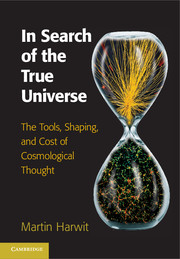Book contents
- Frontmatter
- Contents
- Preface
- Notes on Usage
- 1 The Nineteenth Century's Last Five Years
- Part I The Import of Theoretical Tools
- Part II A National Plan Shaping the Universe We Perceive
- Part III The Cost of Discerning the True Universe
- 14 Organization and Functioning of the Astronomical Community
- 15 Language and astrophysical Stability
- 16 An Economically Viable Astronomical Program
- Epilogue
- Appendix: Symbols, Glossary, Units and Their Ranges
- Index
- References
15 - Language and astrophysical Stability
Published online by Cambridge University Press: 05 December 2013
- Frontmatter
- Contents
- Preface
- Notes on Usage
- 1 The Nineteenth Century's Last Five Years
- Part I The Import of Theoretical Tools
- Part II A National Plan Shaping the Universe We Perceive
- Part III The Cost of Discerning the True Universe
- 14 Organization and Functioning of the Astronomical Community
- 15 Language and astrophysical Stability
- 16 An Economically Viable Astronomical Program
- Epilogue
- Appendix: Symbols, Glossary, Units and Their Ranges
- Index
- References
Summary
Although most astronomers assign particular importance to the problems on which they are currently working, our understanding of the Universe will not advance satisfactorily unless the community can agree on a coherent research plan with a well-defined thrust. The plan cannot be too rigid; otherwise unanticipated initiatives leading to novel insight will be thwarted. Nor should changes in direction be opposed as we learn more and realize a deliberate course correction is needed.
These criteria seem mutually contradictory, so that care is required in respecting them. In Chapter 2 we saw how different scientists approach a given problem by disparate means, guided primarily by tools in whose use they have developed skill and confidence. Faced with a novel problem, they thus reach for distinct tools in their search for increased insight. But before the community can persuade itself that the use of a particular set of tools has indeed led to a significant advance, trusted experts may first need to explain to each other how the respective tools work and the findings to which they point. The present chapter shows how this mutual persuasion may most effectively be pursued.
How to Revive a Spacecraft Millions of Miles Away in Space
I introduce the problem of reviving a spacecraft because it stresses the overarching significance of language in shaping the way scientists and engineers manage to repair a complex system when it breaks down. The astrophysics community may benefit from adopting a similarly formal approach for weeding out errors thwarting the field's progress, formulating long-term communal plans for astrophysical research and archiving astronomical data so it may benefit future generations.
- Type
- Chapter
- Information
- In Search of the True UniverseThe Tools, Shaping, and Cost of Cosmological Thought, pp. 329 - 349Publisher: Cambridge University PressPrint publication year: 2013



